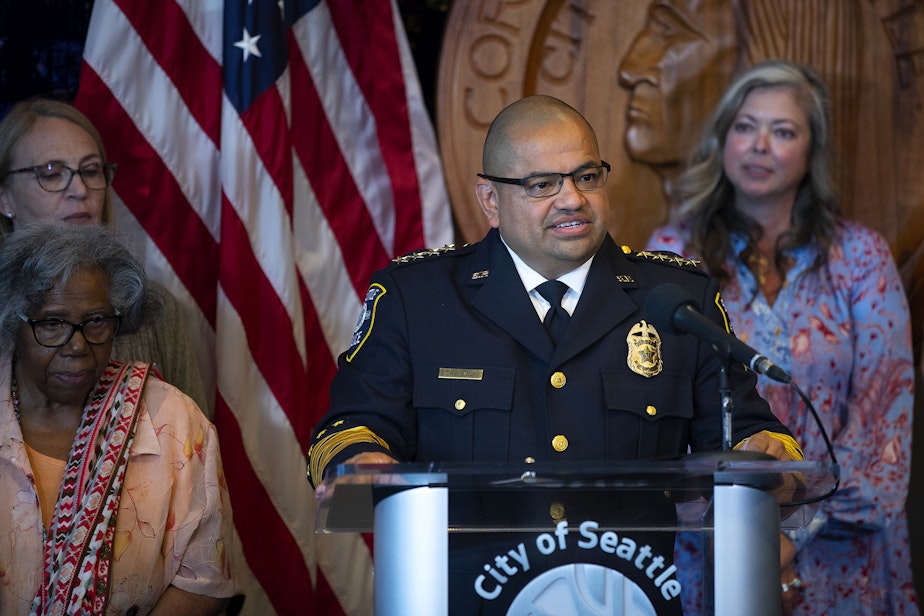Police vehicle pursuits mostly on pause in Seattle due to lack of training

A new law intended to loosen some restrictions on police vehicle pursuits may have the effect of curtailing those pursuits instead.
After the murder of George Floyd, Washington state in 2021 established guidelines allowing police to engage in vehicle pursuit only in specific instances.
On May 3, Gov. Jay Inslee signed into law Senate Bill 5352, which loosened the restrictions, but required that officers take specific training courses before they can engage in pursuits.
Hours later, Seattle Police Chief Adrian Diaz wrote in an email to staff that effective immediately no Seattle officer may engage in a vehicle pursuit unless the officer had the training required by Senate Bill 5352. Sources within the department say very few officers have taken this training yet, and that it may take a significant amount of time to get more officers to complete the training.
“We fully understand the risks associated with suspending pursuits for the vast majority of the department,” Diaz wrote. “We are also mindful of the risk to our employees and to the department for not complying with state law.”
Sponsored
Seattle Police officials denied a request for an interview, but in an emailed response said that the department was “complying with the new legal restrictions while working to better understand the scope of these new requirements.”
They wrote that the police department was in talks with the Criminal Justice Training Commission and the City Attorney’s Office to make sure their department’s pursuit policy complies with the new law and that Seattle police have the training and tools necessary to execute police pursuits lawfully.
Senate Bill 5352 cleared the Senate in a 26 to 22 vote, with prominent Democrats and Republicans saying there is more work to do.
In previous coverage by KUOW, Sen. John Lovick, a Democrat from Mill Creek who spent more than three decades serving in the Washington State Patrol said high-speed chases are highly dangerous and that officers have a duty to limit their use. Lovick sponsored SB 5352 and supported the changes it required.
On the other side of the aisle, State Rep. Gina Mosbrucker (R-Goldendale) said she thinks the guidelines for high-speed pursuits should be lowered to where they were before the changes in 2021.
Update 5/10/23:
Monica Alexander is the Executive Director of the Washington State Criminal Justice Training Commission, which runs the Basic Law Enforcement Academy for new police recruits.
She said the commission doesn’t track how often individual agencies provide updated vehicle training, and the Seattle Police Department is the only one to raise concerns over the training prerequisites in Senate Bill 5352, at least so far.
The new law requires that “the pursuing officer must have completed an emergency vehicle operator’s course, must have completed updated emergency vehicle operator training in the previous two years, where applicable, and must be certified in at least one pursuit intervention option."
“Chief Diaz called me really quickly after the bill was signed,” Alexander said. But she said the academy already has a backlog of recruits waiting to attend, and can’t provide additional field training. Academy recruits spend a “traffic week” with Washington State Patrol where they complete the Emergency Vehicle Operators Course (EVOC) specified in the law. She said the academy does certify instructors who provide training at other agencies.
“There’s a lot of different ways to work through this until you can get all of your officers trained, and I’m sure Chief Diaz is thinking about all of his options right now,” Alexander said.
She said Seattle Police may not be in a hurry to do pursuits, or could rely on officers who already have qualifying training. The department has already sent "quite a few people" to the training agency in recent years, she said.
Alexander said if officers just lack training in a pursuit intervention option, it’s easier to provide training in Stop Sticks, used to deflate the tires of a fleeing vehicle, because officers can receive that training without a driving track.
“That is a little bit easier to train than pursuit driving because you really are just learning how to throw them out, pull them back, and get yourself out of the way for safety reasons," she said.
Officer Ora Hamel is the spokesperson for the Everett Police Department. She said the passage of Senate Bill 5352 has not had any immediate impact because Everett's current pursuit policy is more restrictive than the new state law, and because all Everett officers receive updated EVOC training annually.
But Hamel said command staff and legal advisors are reviewing the new law to determine any necessary updates to city policies. She said the agency could implement Stop Stick training to meet the requirement for a pursuit intervention option. Hamel said under Everett Police policies, PIT driving maneuvers are considered a use of deadly force and would not be seen as a legitimate tactic to end pursuits.
In his email to Seattle Police staff, Chief Diaz said training in PIT maneuvers would be one of the qualifications for officers to be eligible to initiate vehicle pursuits.
Diaz wrote, "Effective immediately, no SPD officer may engage in a pursuit unless the officer involved in the pursuit has been trained in EVOC ( or EVOC update within the last two years) and has been previously trained in the Pursuit Intervention Technique (PIT) while employed by the Seattle Police Department. Any pursuit must also meet all current requirements in policy."


